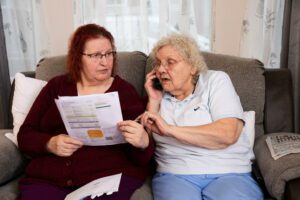Help with housekeeping
Tags
Visiting care
How can you help older loved ones keep their house clean?
How often do you clean your home? When it comes to housekeeping, most of us will know how quickly things can spiral if we don’t chip away at it each day. Whether this means sticking a load of laundry on before the basket overflows, giving the floor a quick run around with the vacuum, or finding a home for the things piling up on the kitchen counter – consistency is key to keeping a home clean and safe.
In later life however, physical limitations can make it even harder to keep up with daily tasks. Even seemingly straightforward household chores take a lot of strength and stamina – for example, a full basket of wet laundry can be really heavy and difficult to carry unaided. Reaching hard to reach spots with a duster can also be dangerous if you’re not as steady on your feet as you once were.
This is why a lot of older people arrange for friends, family, or professionals to provide some level of housekeeping help.
There's no shame in asking for help
Some older people can be sceptical about bringing in help, especially from a professional service. It can sometimes be viewed as the beginning of declining independence. However, people of all ages rely on professional cleaning services. In fact, a recent YouGov survey found that 17% of all British households pay a domestic cleaner to help them at home.
Employing a house cleaner simply means that the tasks you don’t enjoy or are finding difficult are taken care of, leaving you more time to focus on the things that you do enjoy. It can also provide peace of mind to family members, ensuring their loved one doesn’t need to put themselves at risk doing domestic tasks alone.
Making cleaning easier in later life
If you or a loved one have been finding daily cleaning difficult, but would like to try and stay as self-sufficient as possible, there are some small changes you could try –
Changing how you approach tasks
It’s important to be honest about what you can confidently do by yourself. This can help you identify new approaches to certain tasks, as well as how often you may need someone to call round and give you a hand. For example if you find it difficult to push or pull your vacuum cleaner around, you may find it more comfortable to give the floors a quick sweep when they need it, and have a friend or carer come and do a proper vacuum every couple of weeks.
Organising cleaning products and getting the right equipment
If you live in a house, it can help to have a set of cleaning products on each floor, to save you carrying supplies up and down stairs. You may wish to keep supplies on a wheeled trolley or cart too to make it easier to go from room to room.
You may find replacing certain supplies and equipment beneficial as well. For example a lot of cleaning products can be irritating to delicate older skin, or have a strong scent which may impact breathing or cause you to cough. Switching these for natural, chemical free products could be a lot safer. Other switches include –
- A long-handled dustpan and broom, so you don’t need to bend down or kneel
- A duster with an extendable handles so you can reach difficult corners without standing on a chair or stepladder
- A grabber tool to easily pick small items off the floor without bending down
Avoiding dangerous clutter
Keeping a dedicated box for miscellaneous items such as magazines, recyclables, batteries etc. can stop them piling up all over table tops and counters, where they can fall on the floor and create a trip hazard. You can go through the box when it’s full and decide if anything is worth keeping. If you live in a home with stairs you may be tempted to leave items that need to go upstairs on the stairs themselves, however this can be really dangerous. Instead look into storage baskets you can attach to the stairs or bannister to keep items out the way until you need to take them up or down the stairs.
Free cleaning services for older people
If you need some help with housekeeping but are not sure you can afford it, some UK organisations and charities offer occasional cleaning services for free or at a discounted rate. They include –
- Age UK
- The Royal Voluntary Service
- The British Red Cross
- Grant a Smile (for those living with mental health / chronic health conditions)
These services are usually aimed at those who don’t have friends or family to help them, who are on a low or limited income, or are living with a health condition that makes cleaning difficult. It’s worth noting these services are often provided by volunteers – not professional housekeepers, and because these services rely on volunteers, availability can differ in across the UK. So, if you’re looking for regular weekly cleaning you may be better off looking professional support.
Housekeeping support from a home carer
If you need support in other areas of daily life, for example, with cooking, getting washed and dressed, or managing your calendar and bills, a domestic home care worker could also help with your housekeeping needs during daily or weekly scheduled visits.
While the bulk of their work should be focused on care and companionship, maintaining a certain standard of cleanliness and hygiene is an important part of any home carer’s job. It’s why most care services and self-employed carers include light cleaning in their listed duties.
We are extremely grateful to Elizabeth for all her help. She also did some lovely cooking, cleaning and general house duties. We will definitely ask for Elizabeth if we require more help in the future.
Emma, Elder customer
What cleaning tasks can a home carer help with?
- Bathroom cleaning – Keeping floors dry, cleaning the toilet and wiping surfaces
- Kitchen cleaning – Wiping surfaces, washing dishes, emptying bins
- Keeping appliances clean – Wiping down fridge shelves and inside the microwave
- Floor cleaning – Moping and vacuuming
- Spring cleaning – Helping swap clothing and soft furnishings when the season change
- Laundry – Changing bed linens, loading and unloading the washing machine, hanging washing out to dry
- Supporting professional cleaning visits – Helping with daily upkeep ahead of a professional deep clean
If cleaning, organisation and life admin make up the bulk of the support you need, you may be better suited to the services of a self-employed visiting carer. They’re often a lot more flexible in the support they can offer. They’ll usually be more affordable than a domiciliary care agency too, as you won’t be paying for specialist care skills that you’re not using.
Ask them questions
For example, are there any light cleaning tasks they don’t/ can’t do? Do they need you to provide PPE or will they bring their own?
Be realistic about timings
Personal care and housekeeping can take longer than expected, so you may need to extend the length of certain visits to ensure they have plenty of time to provide the right support.
Check whether you’ll have the same carer each care visit
This can make things a lot easier as you won’t need to explain things multiple times or show different carers where things are kept.
Find a local home carer with Elder
Find a local home carer with Elder
Elder is an award leading platform that matches self-employed carers to families and older people needing a wide range of support. With Elder you can –
Elder is an award leading platform that matches self-employed carers to families and older people needing a wide range of support. With Elder you can –
- Choose the same carer or team of carers for your home visits
- Easily book and manage your care schedule online
- Control exactly what tasks your home carer helps with and when
- Choose the same carer for each visit
- Manage everything online
- Control how and when your carer helps you
Professional cleaning and housekeeping services
While home carers offer a wide range of services – larger deep cleaning jobs are best left to domestic cleaning services. This is to protect your carer’s safety (they shouldn’t be climbing step ladders or moving heavy furniture to clean behind it). It also ensure their time and skills are utilised in the best way possible. For example, if you’ve employed a carer to predominantly provide personal care, they should be able to this to the best of their ability, without feeling rushed or pressured into doing adhoc specialist cleaning tasks too.
- Window cleaning – Thorough cleaning both inside and outside
- Oven cleaning – Scrubbing burnt on food and removing stains
- Upholstery cleaning – Vacuuming and stain removal of soft furnishings
- Carpet cleaning – Steam cleaning carpets to eliminate bacteria and contaminants
- Bathroom descaling – descaling tiles, faucets, and fixtures
- Defrosting freezers and removing food residue
- Cleaning walls, doors, and skirting boards
- Laundry service – if you have items that need dry cleaning, or a large amount of laundry each week
How to find good, reliable cleaners near you
If you’re looking for a professional cleaning service to help with deep cleaning it’s important to do so through trusted channels. Unfortunately there are people out there who will take advantage of elderly clients, either by charging over the odds for poor work, or by taking money upfront and failing to show up to provide the house cleaning services they promised.
The following could help you protect yourself or a loved one –
- Ask for personal recommendations from friends and neighbours. If you’re using an online community such as Facebook or Nextdoor, be wary of anyone offering their services if you’re unable to find any reviews from previous clients
- Never agree to cleaning services solicited on your doorstep by someone you don’t know, or who calls round unexpectedly
- Use trusted directories such as Housing Housing Care or Trust a Trader, or contact your local council, as they may keep a list of cleaning services.
- Gather a few quotes from cleaners to understand what the going hourly rate in your area should be before making any final decisions.
- Ask about their standard procedures. For example will it be the same cleaner or cleaners each week? Will they provide their own cleaning products? And will they empty bins or make beds?
Find your ideal carer
We have connected over 5,000 families and carers across the UK. Search for yours today.
Read more

Active Leeds – how older people can stay active and meet new friends
Regular physical activity isn’t just about keeping fit—it’s about maintaining our independence, enhancing our mental health, and improving our overall quality of life. While our

Meals on wheels in Leeds – getting quality meals delivered locally
Even if you love to cook, preparing meals can become more challenging in later life. Lifting heavy pans, using knives and exposure to extremely hot

Carers rights day 2024 – Get the support you’re entitled to
Each year Carers UK holds Carers Rights Day to raise the voice of the UK’s 5.7 million unpaid carers and raise awareness about caregiving rights.

Home help for the elderly – daily admin support
When you think about the type of care and support a person may need in later life, you may think of personal care tasks, such

Visiting care – your complete guide to home care visits
What to expect during a home care visit From hourly care from a professional care worker, to regular nursing visits – find out how to

Elder fraud and scams – staying safe in later life
Fraud can happen to anyone, but sadly vulnerable people and those over pension age are regularly targeted. A report by Age UK indicates that almost